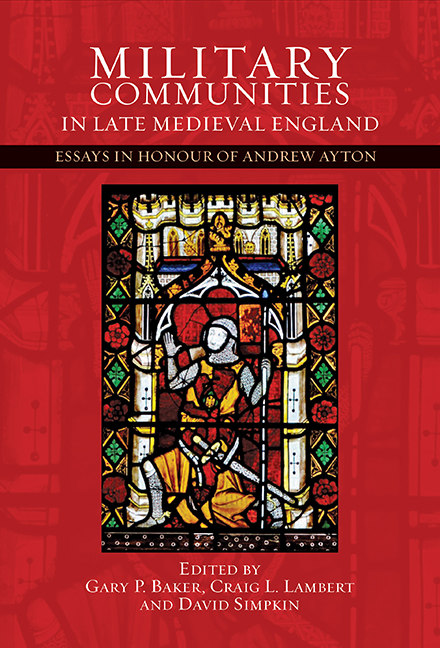Book contents
- Frontmatter
- Miscellaneous Frontmatter
- Contents
- List of Illustrations
- Acknowledgements
- List of Contributors
- Foreword
- Andrew Ayton: A Brief Tribute
- Andrew Ayton: A Recognition of his Work
- Abbreviations
- Part Title
- 1 ‘Big and Beautiful’. Destriers in Edward I's Armies
- 2 Cum Equis Discoopertis: The ‘Irish’ Hobelar in the English Armies of the Fourteenth Century
- 3 Andrew Ayton, the Military Community and the Evolution of the Gentry in Fourteenth-Century England
- 4 Knights Banneret, Military Recruitment and Social Status, c. 1270–c. 1420: A View from the Reign of Edward I
- 5 Sir Henry de Beaumont and His Retainers: The Dynamics of a Lord's Military Retinues and Affinity in Early Fourteenth-Century England
- 6 Financing the Dynamics of Recruitment: King, Earls and Government in Edwardian England, 1330–60
- 7 The Symbolic Meaning of Edward III's Garter Badge
- 8 Sir Robert Knolles’ Expedition to France in 1370: New Perspectives
- 9 The Organisation and Financing of English Expeditions to the Baltic during the Later Middle Ages
- 10 Naval Service and the Cinque Ports, 1322–1453
- 11 The Garrison Establishment in Lancastrian Normandy in 1436 according to Surviving Lists in Bibliothèque Nationale de France manuscrit français 25773
- Bibliography of the Writings of Andrew Ayton
- Index
- Tabula Gratulatoria
- Warfare in History
9 - The Organisation and Financing of English Expeditions to the Baltic during the Later Middle Ages
from Part Title
Published online by Cambridge University Press: 17 July 2019
- Frontmatter
- Miscellaneous Frontmatter
- Contents
- List of Illustrations
- Acknowledgements
- List of Contributors
- Foreword
- Andrew Ayton: A Brief Tribute
- Andrew Ayton: A Recognition of his Work
- Abbreviations
- Part Title
- 1 ‘Big and Beautiful’. Destriers in Edward I's Armies
- 2 Cum Equis Discoopertis: The ‘Irish’ Hobelar in the English Armies of the Fourteenth Century
- 3 Andrew Ayton, the Military Community and the Evolution of the Gentry in Fourteenth-Century England
- 4 Knights Banneret, Military Recruitment and Social Status, c. 1270–c. 1420: A View from the Reign of Edward I
- 5 Sir Henry de Beaumont and His Retainers: The Dynamics of a Lord's Military Retinues and Affinity in Early Fourteenth-Century England
- 6 Financing the Dynamics of Recruitment: King, Earls and Government in Edwardian England, 1330–60
- 7 The Symbolic Meaning of Edward III's Garter Badge
- 8 Sir Robert Knolles’ Expedition to France in 1370: New Perspectives
- 9 The Organisation and Financing of English Expeditions to the Baltic during the Later Middle Ages
- 10 Naval Service and the Cinque Ports, 1322–1453
- 11 The Garrison Establishment in Lancastrian Normandy in 1436 according to Surviving Lists in Bibliothèque Nationale de France manuscrit français 25773
- Bibliography of the Writings of Andrew Ayton
- Index
- Tabula Gratulatoria
- Warfare in History
Summary
Andrew Ayton's research has illuminated our understanding of royal military service by the fourteenth-century aristocracy and how the king drew on existing socio-economic networks to assemble his armies. But what did the Edwardian military community do when there were no royal armies to join? And how were private military activities organised and funded? During the fourteenth and early fifteenth centuries, numerous English magnates and knights, along with their followers, travelled to Prussia to join the Teutonic knights in their campaigns against the pagan (at least until 1386) Lithuanians. The historiography has concentrated on whether these Baltic expeditions can properly be termed crusades or whether they are better viewed as exercises in chivalric vanity. The Baltic excursions of the Western European aristocracy have been described as ‘chivalrous package tours’, a ‘safari’ and even ‘a parade of bored nobles seeking parties and pageantry … and finding excitement in the forests of Lithuania chasing human game’. This essay will not wade into the debate over the relative importance of religious or touristic motivations but will instead focus on how such expeditions were funded and assembled, including the existing and future military links between fellow crusaders.
As we shall see, the evidence concerning English participation in the Baltic crusades is patchy. What there is, including deponent testimony from the Court of Chivalry, suggests that involvement in military campaigns beyond the scope of national warfare was not uncommon and that these expeditionary parties drew upon existing networks. Andrew Ayton has recently stressed the importance of the ‘dynamics of recruitment’, which ‘moulded military service as a social and cultural phenomenon: they explain the incidence of military service – who served, when, where and with whom – and thus the accumulation of actual experience that fuelled fortunes and mentalities, individual and collective’. The investigation of military networks is currently undergoing a transformation as historians begin to use the computational power of relational databases to analyse huge amounts of nominal data. Most historians have concentrated on service in royal armies, for which the surviving evidence is most plentiful, but many of the soldiers who fought for the English kings also took part in expeditions to the Baltic.
- Type
- Chapter
- Information
- Military Communities in Late Medieval EnglandEssays in Honour of Andrew Ayton, pp. 181 - 210Publisher: Boydell & BrewerPrint publication year: 2018



